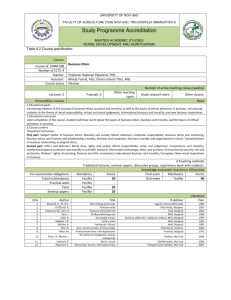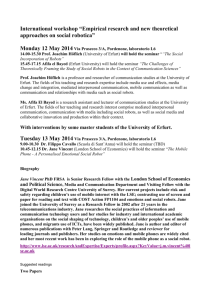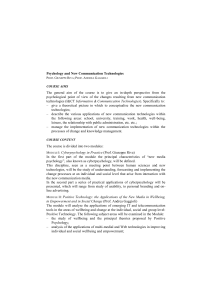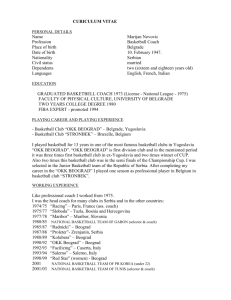UNIVERSITY OF NOVI SAD FACULTY OF AGRICULTURE 21000
advertisement
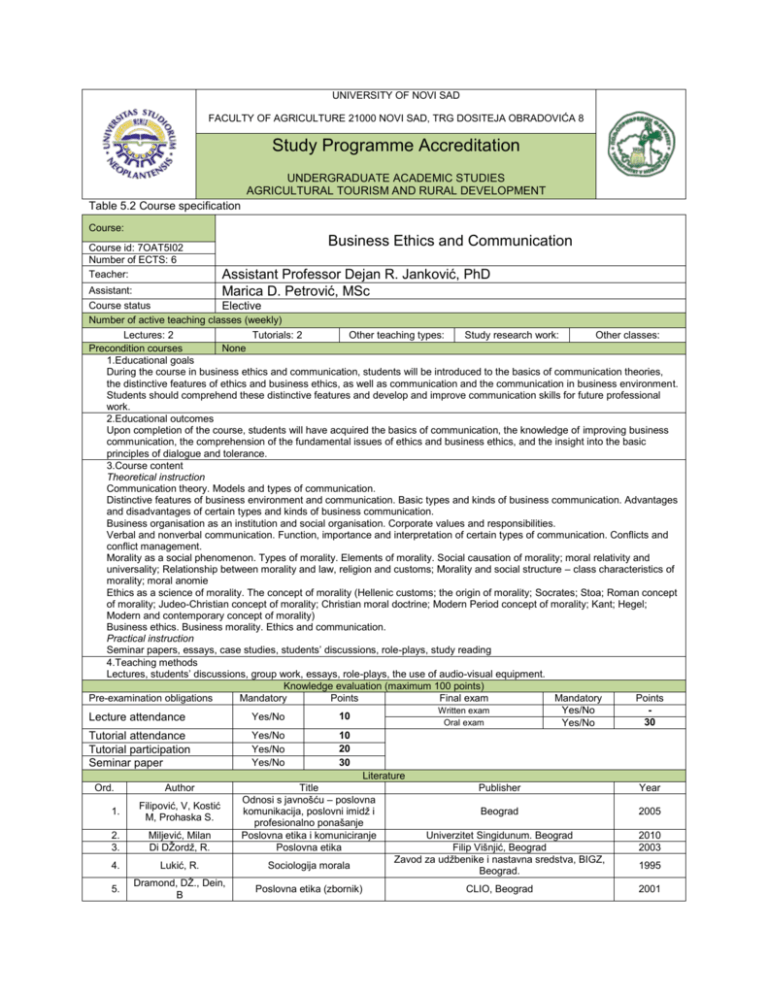
UNIVERSITY OF NOVI SAD FACULTY OF AGRICULTURE 21000 NOVI SAD, TRG DOSITEJA OBRADOVIĆA 8 Study Programme Accreditation UNDERGRADUATE ACADEMIC STUDIES AGRICULTURAL TOURISM AND RURAL DEVELOPMENT Table 5.2 Course specification Course: Course id: 7ОАТ5I02 Number of ECTS: 6 Teacher: Business Ethics and Communication Assistant Professor Dejan R. Janković, PhD Assistant: Marica D. Petrović, MSc Course status Elective Number of active teaching classes (weekly) Lectures: 2 Tutorials: 2 Other teaching types: Study research work: Other classes: Precondition courses None 1.Educational goals During the course in business ethics and communication, students will be introduced to the basics of communication theories, the distinctive features of ethics and business ethics, as well as communication and the communication in business environment. Students should comprehend these distinctive features and develop and improve communication skills for future professional work. 2.Educational outcomes Upon completion of the course, students will have acquired the basics of communication, the knowledge of improving business communication, the comprehension of the fundamental issues of ethics and business ethics, and the insight into the basic principles of dialogue and tolerance. 3.Course content Theoretical instruction Communication theory. Models and types of communication. Distinctive features of business environment and communication. Basic types and kinds of business communication. Advantages and disadvantages of certain types and kinds of business communication. Business organisation as an institution and social organisation. Corporate values and responsibilities. Verbal and nonverbal communication. Function, importance and interpretation of certain types of communication. Conflicts and conflict management. Morality as a social phenomenon. Types of morality. Elements of morality. Social causation of morality; moral relativity and universality; Relationship between morality and law, religion and customs; Morality and social structure – class characteristics of morality; moral anomie Ethics as a science of morality. The concept of morality (Hellenic customs; the origin of morality; Socrates; Stoa; Roman concept of morality; Judeo-Christian concept of morality; Christian moral doctrine; Modern Period concept of morality; Kant; Hegel; Modern and contemporary concept of morality) Business ethics. Business morality. Ethics and communication. Practical instruction Seminar papers, essays, case studies, students’ discussions, role-plays, study reading 4.Teaching methods Lectures, students’ discussions, group work, essays, role-plays, the use of audio-visual equipment. Knowledge evaluation (maximum 100 points) Pre-examination obligations Mandatory Points Final exam Mandatory Points Written exam Yes/No 10 Yes/No Lecture attendance Oral exam 30 Yes/No 10 Yes/No Tutorial attendance 20 Yes/No Tutorial participation 30 Yes/No Seminar paper Literature Ord. Author Title Publisher Year Odnosi s javnošću – poslovna Filipović, V, Kostić 1. komunikacija, poslovni imidž i Beograd 2005 M, Prohaska S. profesionalno ponašanje 2. Miljević, Milan Poslovna etika i komuniciranje Univerzitet Singidunum. Beograd 2010 3. Di DŽordž, R. Poslovna etika Filip Višnjić, Beograd 2003 Zavod za udžbenike i nastavna sredstva, BIGZ, 4. Lukić, R. Sociologija morala 1995 Beograd. Dramond, DŽ., Dein, 5. Poslovna etika (zbornik) CLIO, Beograd 2001 B 6. 7. 8. Torington, D, Hal, Menadžment ljudskih resursa Datastatus, Beograd 2004 L., Tejlor, S. Baldwin, T., Bommer, W., Rubin, Developing Management Skills McGraw-Hill International Edition 2008 R. Essay and discussion literature: Kant, I. (1990): Kritika praktičnog uma, BIGZ, Beograd., Orlić, R. (2004): Kant i poslovna etika, (hrestomatija), Mali Nemo, Pančevo. Veber, M. (1975): Protestantska etika i duh kapitalizma, Prosveta, Beograd., Aristotel (1980). Nikomahova etika. BIGZ, Beograd. Kangrga, M. (2004). Etika: osnovni problemi i pravci. Golden Marketing. Tehnička knjiga.Zagreb. Uzelac, M. (2003). Istorija filozofije I, II. Vršac. Miloš Đurić (1997). Istorija helenske etike. Zavod za udžbenike. Beograd. Platon, Odbrana Sokratova, Protagora, Država (I, IV, V, VI, IX, X). Spinoza (1970). Etika. Kultura. Beograd. Šušnjić, Đ. (1997). Dijalog i tolerancija. Čigoja štoampa. Beograd. i dr.
